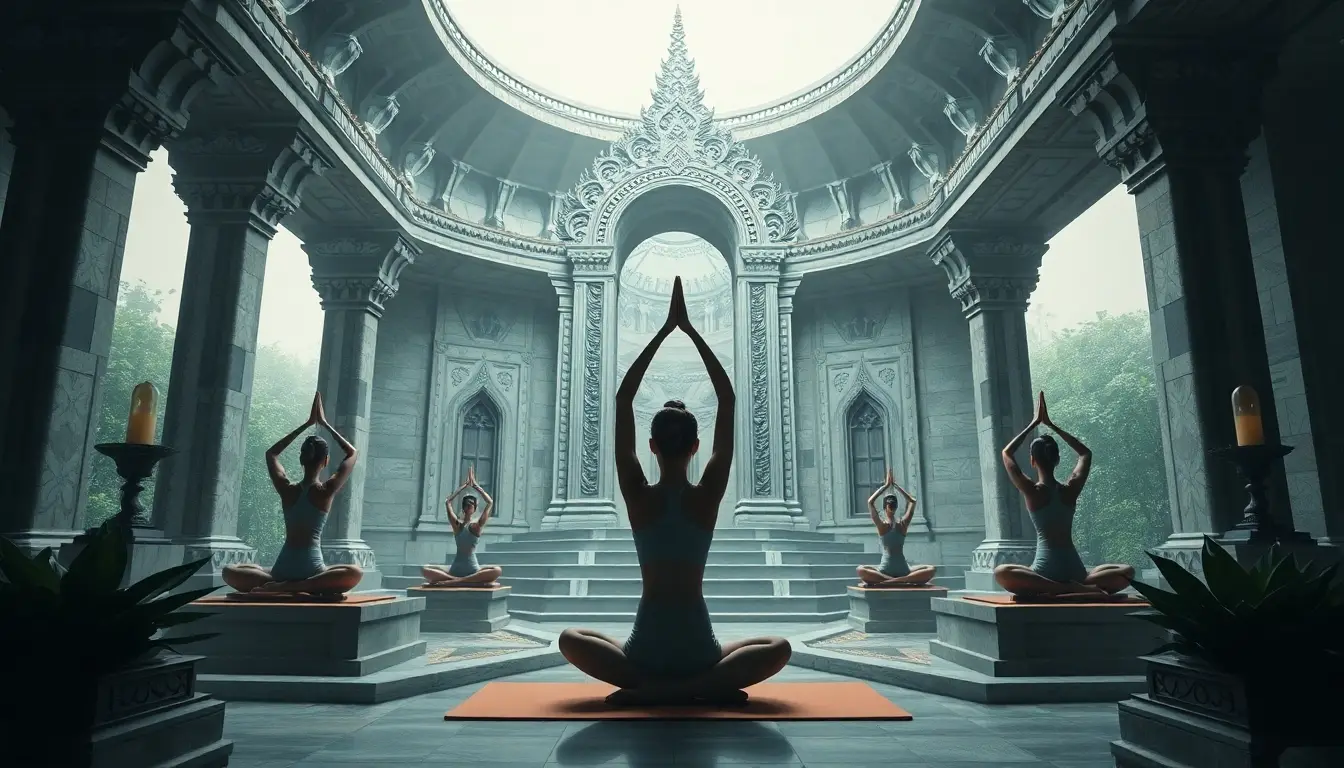Table of Contents
ToggleUnderstanding Limitation in the Context of Yoga and Holistic Practices
Limitation refers to the constraints that can affect our physical and mental potential. This concept is particularly relevant in yoga and holistic therapy, where understanding and overcoming limitations can lead to personal growth and wellness. Exploring this topic invites deeper self-reflection and awareness.
Defining Limitation in Yoga Practices
Limitation is often perceived as a barrier to achieving one’s goals, particularly in yoga. Within this framework, limitation manifests through physical restrictions, emotional blocks, and mental barriers. Recognizing these limitations can pave the way for a deeper understanding of oneself.
As practitioners of yoga engage with their bodies and minds, they may confront various limitations. These could range from physical inflexibility to mental distractions that hinder practice. Acknowledging such limitations is the first step in overcoming them, facilitating a more enriching experience on the mat.
Understanding these limitations also allows individuals to adjust their approaches to yoga safely. By modifying postures and embracing a gentle, self-compassionate attitude, practitioners can navigate their unique constraints. This alignment supports personal growth while honoring individual experiences.
- Physical limitations can include injuries or stiffness.
- Mental limitations may arise from stress or negative self-talk.
- Emotional limitations can be linked to unresolved feelings or fears.
How Limitation Affects Personal Growth
Limitation shapes personal growth in myriad ways. By confronting challenges head-on, individuals can gain valuable insights about their own resilience and adaptability. This examination fosters a culture of continuous improvement, enriching both personal and collective experiences.
Additionally, limitations encourage mindfulness and presence. When practitioners consciously acknowledge their limitations, they cultivate a deeper connection to their bodies and minds. This increased awareness can result in enhanced focus that ultimately transforms the practice into a powerful tool for personal development.
Finally, addressing limitations can also promote empathy and understanding among practitioners. By sharing experiences and challenges, individuals can foster a supportive community that values compassion and shared growth. This sense of unity is essential in holistic practices, reinforcing the importance of collective learning.
The Role of Limitation in Holistic Therapy
Limitation plays a significant role in holistic therapy, guiding practitioners to explore the intricacies of body, mind, and spirit. These constraints often reveal areas where healing can occur, prompting individuals to delve deeper into their emotional and spiritual landscapes.
In holistic therapy, the recognition of limitation helps practitioners establish meaningful goals and intentions. By identifying specific areas of concern, clients can explore pathways to healing and self-improvement, ultimately fostering transformation and resilience.
Moreover, limitations provide valuable insights into patterns of behavior that may hinder progress. Understanding these patterns is crucial for devising effective and personalized therapeutic approaches. This knowledge empowers individuals to confront fears, biases, and habits that can inhibit growth.
- Exploring emotional limits can reveal deep-rooted issues.
- Physical limitations guide targeted therapeutic interventions.
- Recognizing mental limitations transforms thought patterns.

Embracing Limitation in Mindfulness and Meditation
Embracing limitation is fundamental in mindfulness and meditation practices. By acknowledging the presence of limitations, practitioners can develop self-acceptance and compassion. This perspective encourages a non-judgmental approach to thoughts and feelings, enhancing the meditation experience.
Moreover, limitation serves as a reminder that growth is a process. Through consistent practice, individuals learn to navigate the ebb and flow of their thoughts. This journey reinforces the notion that limitations are not fixed barriers but opportunities for exploration and understanding.
Lastly, this acceptance can lead to profound insights and personal revelations. It allows individuals to cultivate resilience in the face of challenges, embracing the journey of self-discovery. This transformational process reflects the core tenets of holistic practice and personal growth.

Exploring the limitations of the body through yoga can lead to greater self-awareness and personal growth.
Understanding Limitation in Personal Growth
Limitation plays a critical role in personal growth and self-discovery. Acknowledging and understanding limitations allows individuals to make informed choices about their life paths. It fosters self-awareness and leads to better decision-making.
When we recognize our limitations, we develop a healthier relationship with our goals. This understanding facilitates realistic expectations and promotes resilience in the face of challenges. Consequently, individuals can navigate their paths with clarity and purpose.
- Clarity in setting achievable goals
- Better resilience in facing obstacles
- Enhanced self-awareness and understanding
Embracing Limitation for Mental Well-being
Embracing limitation can have a profound effect on mental well-being. When individuals accept their constraints, they free themselves from unnecessary stress and anxiety. This acceptance creates a space for focusing on strengths and opportunities.
Moreover, limitations encourage individuals to seek alternative solutions and creative ways of overcoming obstacles. This adaptability enhances problem-solving skills and boosts overall confidence. Recognizing limitations can directly lead to improved emotional health.
- Reduction in stress levels
- Boost in creative problem-solving
- Improved confidence through acceptance
The Positive Side of Limitation in Relationships
Limitations can strengthen relationships by fostering open communication and understanding. When individuals share their boundaries, they create a foundation of trust that deepens connections. This transparency is crucial for nurturing healthy interactions.
Limitation also sets the stage for mutual respect within relationships. By understanding each other’s boundaries, individuals can provide support without overstepping. This dynamic fosters a safe environment for emotional growth.
- Enhanced communication skills
- Development of mutual respect
- Creation of a supportive environment
Coping with Limitations in Professional Life
Coping with limitations in a professional setting can lead to significant advancements in one’s career. By understanding personal boundaries, individuals can prioritize tasks effectively. This prioritization leads to enhanced productivity and job satisfaction.
Moreover, recognizing professional limitations encourages individuals to seek collaboration. Teamwork thrives in environments where individuals acknowledge their strengths and weaknesses, leading to innovative solutions and successful project outcomes.
- Increased productivity through task prioritization
- Enhanced team collaboration and innovation
- Greater job satisfaction from realistic goals

Understanding limitation in various aspects of life fosters personal and professional growth. By acknowledging these constraints, individuals can develop healthier mindsets that promote success and happiness.
Navigating Health and Well-being through Limitation
In the realm of health and well-being, limitation is essential for effective self-care routines. Acknowledging physical boundaries prevents overexertion and promotes longevity in fitness practices. This awareness ensures sustainable progress over time.
Moreover, understanding nutritional limitations can lead to better dietary choices. Recognizing what works for one’s body helps cultivate a balanced lifestyle, resulting in improved health outcomes and increased energy levels.
- Prevention of injuries through proper boundaries
- Improved dietary choices for better health
- Increased energy and overall vitality
Limitations as a Catalyst for Creativity
Limitations often serve as a catalyst for creativity and innovation. When faced with constraints, individuals tap into their creativity to find unique solutions. This process leads to greater adaptability in various life situations.
Creativity thrives in environments where limitation is recognized and accepted. Individuals often discover new skills and passions while working within defined boundaries, leading to unexpected growth and fulfillment.
- Enhanced creativity in problem-solving
- Discovery of new skills and talents
- Greater adaptability in dynamic environments
For more insights on holistic living and personal development, visit Relhum, explore our shop, or read our blog for diverse topics related to your journey. For inquiries, please reach out to us at contact.

Caption: Exploring the theme of Limitation through yoga practice.
Understanding Limitation in Our Lives
Limitation refers to the boundaries that define what we can and cannot do in various aspects of our lives. These boundaries can manifest in physical, emotional, or mental forms, influencing our capabilities and experiences. Recognizing and understanding these limitations is the first step toward personal growth.
This awareness allows us to navigate our lives with purpose and intention, promoting a more fulfilling experience. In every area, from yoga to emotional health, limitations play a crucial role in shaping our journey. Acknowledging them can lead to transformative insights that encourage us to push beyond perceived barriers.
Limitation can serve as a motivator, inspiring us to set realistic goals and leading to continuous self-improvement. Rather than viewing it solely as a hindrance, it can be reframed as a guideline that helps us explore our full potential without overexertion.
Five Tips for Embracing Limitation
Embracing limitation can foster a healthier mindset and more meaningful experiences in life. Here are five valuable tips to help you navigate and appreciate limitations effectively.
- Accept Your Current State: Acknowledge where you are and what you can realistically achieve.
- Set Realistic Goals: Define achievable objectives that align with your current capacity.
- Practice Mindfulness: Engage in practices such as meditation and yoga that enhance your awareness of limitations.
- Seek Support: Connect with friends, mentors, or wellness professionals who can help you navigate your limitations.
- Celebrate Small Wins: Recognize and appreciate every step you take toward personal growth despite existing limitations.
Incorporating these tips into your daily routine can lead to a deeper understanding of personal boundaries and help you achieve a better balance in life. Recognizing limitation is not about resignation; it is about fostering a mindful approach towards well-being.

Exploring limitation through yoga offers unique insights into both physical and mental constraints. Yoga encourages practitioners to honor their limits, turning limitation into an opportunity for growth rather than a barrier.
Limitation in Holistic Therapy
Limitation is an essential concept in holistic therapy, guiding practitioners to tailor their approaches based on individual needs and circumstances. By understanding a client’s limitations, therapists can design more effective treatment plans that promote healing without overexertion.
Additionally, exploring limitations can lead to breakthroughs in emotional well-being. Engaging with these boundaries creates a space for clients to process their experiences and find ways to navigate their unique journeys toward health.
Authentic healing invites clients to accept where they are and explore their limitations as part of their growth narrative. This process encourages individuals to step outside perceived restrictions and embrace new paths for emotional and physical wellness.
Developing Resilience within Limitations
Resilience is built upon the foundation of understanding and accepting limitations. Life is filled with challenges that may seem insurmountable at times. However, recognizing these difficulties as limitations rather than failures can change your perspective dramatically.
Developing resilience involves training your mind to view limitations as stepping stones instead of stumbling blocks. It opens a pathway for creative problem-solving, allowing individuals to find innovative ways to work within their constraints effectively.
Moreover, the journey toward resilience is often accompanied by support systems, such as engaging in community groups or seeking guidance from professionals. These connections empower individuals to face their limitations with confidence and determination.
The Role of Limitation in Healthy Eating
In the realm of healthy eating, limitation plays a crucial role in guiding dietary choices. Rather than focusing on strict restrictions, understanding your body’s limitations can help tailor a nutrition plan that is both satisfying and balanced.
By recognizing what foods work best for you and which ones may contribute to discomfort or health issues, you gain valuable insights into your dietary needs and preferences. This mindful approach leads to a more sustainable relationship with food and nutrition.
Ultimately, healthy eating should cultivate well-being without becoming a source of stress. Listening to your body’s limitations fosters a positive mindset and encourages joyful eating experiences.
Conclusion
Understanding and embracing limitation can lead to profound personal growth and a deeper connection to your well-being. Whether in yoga, holistic practices, or healthy eating, acknowledging your limits opens pathways to resilience and fulfillment. Take the time to explore your limitations today, and consider how they shape your journey. For more insights and resources, visit our website at Relhum. Join our community and discover new ways to enrich your life. Reach out through our contact page for any inquiries or support.

Exploring the concept of limitation through yoga practice.
Questions About Limitation
What does limitation mean in the context of yoga practice?
Limitation in yoga practice refers to the physical, mental, or emotional boundaries that may affect an individual’s ability to perform certain asanas, meditations, or breathing exercises. Recognizing these limitations helps practitioners to approach their practice with awareness and self-compassion.
How can understanding my limitations enhance my yoga practice?
Understanding your limitations allows you to practice safely, avoiding injury and frustration. It encourages you to listen to your body, focus on progress, and set realistic goals, fostering a more sustainable and fulfilling yoga experience.
What should I do if I encounter physical limitations while practicing asanas?
If you encounter physical limitations, consider modifying poses, using props, or exploring alternative asanas that accommodate your current ability. It’s also beneficial to work with a qualified instructor who can provide personalized guidance and adjustments.
Can meditation help address emotional limitations?
Yes, meditation can be a powerful tool for addressing emotional limitations. It promotes self-awareness and acceptance, allowing individuals to explore their emotions safely and develop coping mechanisms for challenges they face.
How does pranayama relate to limitations in breath control?
Pranayama, or breath control, helps practitioners recognize their limitations in breathing techniques and gradually expand their capabilities. Regular practice can improve lung capacity and promote relaxation, making it easier to manage stress and anxiety.
Are there limitations to using aromatherapy in holistic therapy?
While aromatherapy can be beneficial, there are limitations to its effectiveness. Individual responses to essential oils vary, and some people may have allergies or sensitivities. It’s vital to consult with a professional before using aromatherapy, especially for specific health conditions.
How can mudras help overcome personal limitations?
Mudras can help enhance focus, balance energy, and promote emotional well-being, providing a supportive tool to help practitioners overcome personal limitations. Regular practice of specific mudras can strengthen determination and self-discipline in various aspects of life.
What are some limitations to consider with healthy eating?
Limitations in healthy eating can include dietary restrictions, food allergies, and access to nutritious food options. It’s important to tailor dietary choices to individual needs and consult with a nutritionist for guidance on maintaining a balanced diet.
How can yoga support women dealing with health limitations?
Yoga can provide significant support to women facing health limitations by offering gentle movement, relaxation techniques, and emotional release. Practices tailored to women’s health can improve physical wellness, enhance self-esteem, and promote a sense of community.
What is the importance of acknowledging limitations in a holistic therapy context?
Acknowledging limitations in holistic therapy helps both practitioners and clients set realistic goals and develop personalized treatment plans. This understanding fosters a compassionate approach to healing and promotes long-term wellness by respecting individual journeys.


